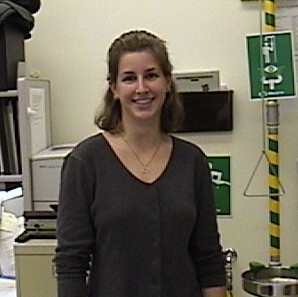Sandra Anderson Sciences
The Interplay Between Local Organization and Activity of a Heterogeneous Base Catalyst
Sandra’s project addresses the synthesis and characterization of imprinted heterogeneous catalysts with local organization at the active site, consisting of hybrid organic-inorganic sol gel materials. One of the challenges facing mankind is the cost effective production of chemicals with less waste to meet the societal needs of an ever-growing population. This requires new heterogeneous catalysts, the most predominant type of catalyst utilized in industry, which are able to conduct chemical reactions with both high activity and selectivity. Biological catalysts, enzymes, are excellent paradigms of controlling catalyst activity and selectivity via the precise placement of functional groups. Translating the efficiency of biological systems to synthetic ones involves tailoring the environment surrounding a catalytically active site on the nanoscale. This can be achieved with the technique of imprinting, which allows control of catalyst structural features including shape, degree of hydrophobicity, and local organization, all of which can significantly affect catalyst performance.
